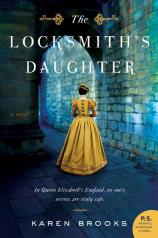The Locksmith's Daughter
Review
The Locksmith's Daughter
Coming in on any new story, people have expectations. While those expectations vary from person to person and change based on factors like genre and author, it’s safe to say that they sometimes overlap. In that vein, the most common of grounds is this: people want something fresh, something they cannot find anywhere else. No story can reinvent the wheel; we’ve been telling stories far too long for that to happen. That desired freshness, then, comes from writers putting a spin on seemingly familiar tales, throwing us for a loop just when we think we know everything.
Karen Brooks’ THE LOCKSMITH’S DAUGHTER, a historical fiction populated by spies and secrets, should excel at this sort of thing. Unfortunately, that is not the case.
Mallory Bright, the titular protagonist, gets entangled in webs of intrigue just as the cover and blurb would have you believe. There is deception, there is sneaking about, there is tension --- all the sorts of things a good spy novel should have. The problem is, at least in my eyes, there is no surprise. From front to back, there was never anything I wasn’t able to predict. I’m not trying to toot my own horn here; in fact, my inferencing skills are often lacking when it comes to sniffing out what’s coming next. That made what could have been a highly enjoyable story just an enjoyable one.
"Brooks evidently did a painstaking amount of research to bring late-16th-century London to life... She also succeeds in rendering several fun, memorable characters."
Indeed, THE LOCKSMITH’S DAUGHTER has redeeming qualities. Brooks evidently did a painstaking amount of research to bring late-16th-century London to life, which you don’t need the author’s note to realize. The dress code, mannerisms and just about everything else comes alive thanks to her consummate attention to detail. The title being what it is, even the most impenetrable of locks are picked open by Brooks’ commendable devotion to accuracy.
She also succeeds in rendering several fun, memorable characters. Among them are the locksmith himself, Mallory’s father Gideon, and Nathaniel Warham, whose multifaceted presence consistently dominates every page he’s on. But for however many hits there are, there are as many duds. Francis Walsingham is perhaps the best example of this; at first mysterious, he becomes quite irritating, as Brooks tends to let him prattle on longer than necessary. The dialogue is hit-or-miss in this sense, sometimes delivered as an interesting back-and-forth and at other times in gigantic chunks that caused my eyes to glaze over.
Mallory herself sits somewhere in between the hit characters and the duds --- which isn’t a great thing, being the title’s promised heroine. Her flaws are few and far between, yet she can’t be called a Mary Sue, either. Her insights are thought-provoking and expand upon the story’s themes, but the things that happen to her are often more engaging than she is. And I don’t want to spoil anything, but for as strong a woman as she ought to be and occasionally is, her actions don’t always line up with her ideals. If not for her inconsistency as a character --- and, more importantly, as a leading female in a genre oversaturated with testosterone --- she easily could have been used as a springboard to discuss women and society. To say the very least, it can be hard to pin Mallory down; when you like her, you like her, and when she confuses you, she confuses you.
THE LOCKSMITH’S DAUGHTER is a story that has been done before, with well-explored themes encased in a beautiful if imperfect package. I don’t regret reading it by any means, but it won’t be a book that I beg my friends and family to read so I have someone to talk about it with.
Reviewed by Benny Regalbuto on August 17, 2018
The Locksmith's Daughter
- Publication Date: July 31, 2018
- Genres: Fiction, Historical Fiction
- Paperback: 576 pages
- Publisher: William Morrow Paperbacks
- ISBN-10: 0062686577
- ISBN-13: 9780062686572




